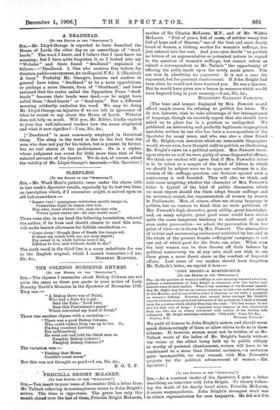A DEADHEAD.
[To TAR rams or Tax "SPECTATOR'] SIB,—Mr. Lloyd-George is reported to have described the House of lords the other day as an assemblage of "dead- heads." The word I know, and I believe that I once knew its meaning; but I have quite forgotten it, so I looked into my "Webster" and there found "deadhead" explained as follows :—" Deadhead. 1. One who receives free tickets for theaters, public conveyances, &cr. (colloquial, U.S.) 2. (Nautical) A buoy." Probably Mr. George's hearers and readers in general have taken "deadhead" to be a more opprobrious, or perhaps a more literate, form of "blockhead," and have assumed that the orator called the Opposition Peers " dead- heads " because their heads were dead,—as he might have called them " dead-hearts " or "dead-eyes." But a different meaning evidently underlies the word. We may be doing Mr. Lloyd-George an injustice if we are left in ignorance of what he meant to say about the House of Lords. Webster does not help us much. Will you, Mr. Editor, kindly explain to your less well-informed readers how the name originated
and what it now signifies am, Sir, &c., D.
[" Deadhead" is most commonly employed in theatrical slang. The sting in the word is due to the fact that the man who does not pay for his ticket, but is present by favour, has no real status at the performance. He is a cipher, whose judgment can count for little more than that of the salaried servants of the theatre. We do not, of course, admit the validity of Mr. Lloyd-George's innuendo.—En. Spectator.]






























































 Previous page
Previous page